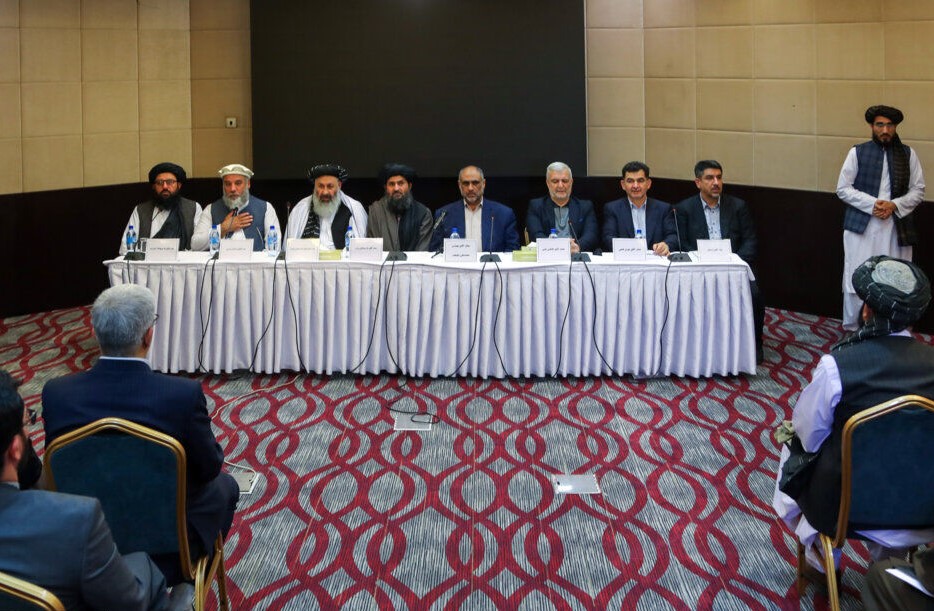The Afghan energy minister and the head of an Iranian power supply company have emphasized the need for increased energy cooperation between the two countries.
The Afghan Taliban de facto government's acting minister of energy and water, Abdul Latif Mansour, proposed a discount to Iranian electricity exports to Afghanistan and requested an end to supply outages in a meeting with Arash Kordi, the head of Iran's Power Transmission, Generation, and Distribution Company (Tavanir) on November 12.
The visiting Afghan officials and their Iranian hosts discussed ways to consolidate bilateral cooperation in the electricity sector. The key goals of the Afghan delegation were the extension of an electricity deal with Iran and the arrival of a "suitable" tariff.
The Afghan minister pointed to Iran's power supply cut to Afghanistan in the current year and urged Iranian authorities to prevent similar problems in the future. Kordi called on Iran to reduce power supply tariff rates and reiterated the need to boost cooperation between Kabul and Tehran in the energy sector.
The Afghan minister started his official visit to Iran on November 11, just a day after another high-powered delegation led by the Taliban government's deputy prime minister for economic affairs, Abdul Ghani Baradar concluded a six-day visit to Tehran.
Economic, political, and migrant issues were among the topics addressed during Baradar’s visit. The Afghan delegation has held several economic talks as well as meetings with high-ranking officials. The delegation has visited various facilities in cities including Tehran, Isfahan, and the port of Chabahar in the south-east.
On November 9, five memorandums of understanding (MoU) on economic cooperation related to mining, steel production, transport, civil aviation, and free trade zones were signed between the Iranian and Afghan delegations.
Speaking at the signing ceremony, Iran's special envoy for Afghanistan, Hassan Kazemi Qomi, said that Iran's policy has always been to help the people of Afghanistan and added that economic cooperation contributes to the stability and security and reduces the problems of Afghanistan.
The Taliban's minister of industry and commerce, Nooruddin Azizi, expressed his hope that the agreements that target a $10bn trade volume between the two countries "do not remain on paper" and will "be converted into a deal".
Iran’s capital Tehran also hosted an Iran-Afghanistan Joint Economic Committee meeting. The formation of joint working groups in fields such as trade, transit, transportation, customs, and the environment was discussed on the first day of the two-day meeting.
On November 9, the Taliban's deputy prime minister met key Iranian officials at Iran's Chabahar port as part of his recent visit and urged the Iranian authorities to allocate land to Afghanistan at a reasonable cost for an extended period in the Chabahar Port.
“This initiative aims to establish the necessary infrastructure to enhance Afghanistan's import and export capabilities through the port, ultimately elevating Afghanistan's transit capacity," reads the statement published by the Afghan deputy PM.
The Iranian officials assured Mullah Baradar that "Afghanistan could commence utilizing Chabahar Port for exports, imports, and transit starting from the following day," and expressed "full readiness to support Afghanistan in this endeavor." The meeting concluded with a "mutual agreement, granting Afghanistan unrestricted access to Chabahar Port and outlining Iran's commitment to providing comprehensive facilities and collaboration to facilitate this access."
On November 8, Roads Minister Mehrdad Bazrpash and the Afghan Taliban's Acting Minister of Aviation and Transport, Mullah Hamidullah Akhundzada, discussed expanding cooperation in air, land, and rail transportation between Iran and Afghanistan. The talks encompassed increasing the number of flights, providing technical and engineering services in aviation, activating the international flight corridor in Afghanistan, and improving road transportation.
Despite Iran having a 35 percent share in Afghanistan's import market, tensions persist over water issues. Iran claims it receives only 4 percent of its rightful share from Afghanistan's Helmand River, citing constraints due to Kabul's damming operations impacting downstream water flow. The Taliban administration attributes the reduced flow to insufficient annual rainfall, emphasizing the need to address these concerns.







 President Ilham Aliyev shed light on the evolving contours of the peace process with Armenia during an international conference in Baku this week. ...
President Ilham Aliyev shed light on the evolving contours of the peace process with Armenia during an international conference in Baku this week. ...
 Azerbaijan and Armenia started the process of demarcation of their border on Tuesday, with the installation of the first border markers based on ge...
Azerbaijan and Armenia started the process of demarcation of their border on Tuesday, with the installation of the first border markers based on ge...
 President Aliyev emphasized the critical role of the North-South Transport Corridor in fostering transport cooperation between Azerbaijan and Russi...
President Aliyev emphasized the critical role of the North-South Transport Corridor in fostering transport cooperation between Azerbaijan and Russi...
 Iran and Pakistan have signed eight cooperation documents in various fields, and agreed to strengthen ties to fight terrorism in the region.
Iran and Pakistan have signed eight cooperation documents in various fields, and agreed to strengthen ties to fight terrorism in the region.
 As the conflict between Ukraine and Russia escalates, the strategic importance of Kharkiv, Ukraine's second-largest city, has come sharply into focus.
As the conflict between Ukraine and Russia escalates, the strategic importance of Kharkiv, Ukraine's second-largest city, has come sharply into focus.
 Iranian President Ebrahim Raisi expressed Tehran’s readiness to participate in significant development projects in Sri Lanka during the inauguratio...
Iranian President Ebrahim Raisi expressed Tehran’s readiness to participate in significant development projects in Sri Lanka during the inauguratio...



